Alumni Perspectives
 Jonathon Baker, PhD
Jonathon Baker, PhD
What is your current position?
I’m a Staff Scientist at the J. Craig Venter Institute in La Jolla, California.
How did your training in MBI help you with your career?
For quite a while now, my career goal is to become faculty at a medical or dental school. Thanks in large part to the training I received during my graduate training at the University of Rochester, I am close to achieving this goal. Earlier this year, I received a K99 Career Development Award from the NIH, which will make me extremely competitive in the faculty job market, as it provides the funding for me to found my own independent research group over the next 5 years. The skills I obtained in graduate school at UofR, through lab work, coursework, and mentoring put me in a position to be highly successful in either academia or industry.
What aspects of our graduate program stand out for you?
I think the mentoring I received stands out. Having now worked in a number of places after graduate school, I have found that compared to many of my peers, I am exceptionally prepared for designing and executing scientific projects, troubleshooting lab protocols, and scientific writing. I think that these abilities are expertise you only gain through lots of one on one mentoring. Another stand out experience was the friendships I had with my classmates. Whether it is attending weddings, going to conferences, or just impromptu FaceTime conversations, I always look forward to reconnecting with my classmates and professors from UofR.
What were the things you like best about living in Rochester?
Rochester is a great place to live during graduate school. Many of my most cherished friendships were cultivated during my time there, and it was easy for me to connect with people. The low cost of living really helps you get a good financial start, and some of my classmates were even able to buy houses during graduate school. For a city of its size, Rochester has great food, and a good arts, music, and entertainment scene. Autumn in Upstate New York is beautiful, and is one of the things I miss the most now that I live on the West Coast. Rochester is also somewhat centrally located to a number of larger cities and regions for outdoor activities, meaning that weekend trips to New York City, Toronto, Boston, the Adirondack Mountains, and the Finger Lakes are easy and very fun.
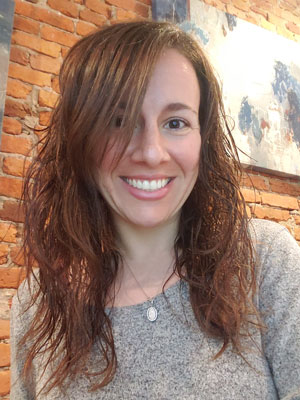 Tara Capece, PhD
Tara Capece, PhD
What is your current position?
I am a Scientific Review Officer at the National Institute of Allergy and Infectious Disease (NIAID) in Rockville, MD. As a Scientific Review Officer, I construct panels of scientists with appropriate expertise to review grant applications and contract proposals submitted to NIAID for funding. A large part of my mission is ensuring fair, unbiased reviews that adhere to NIH review policies and guidelines.
How did your training in MBI help you with your career?
The training I received during my graduate education – from technical skills in the lab and knowledge from coursework and seminars to teaching and mentoring opportunities - was engaging and comprehensive. The faculty in MBI are excellent mentors that want to see you grow and succeed to the best of your abilities. My current position is administrative and there were plenty of opportunities for me to be involved in the planning, organizing, and execution of activities and meetings in the Department of Microbiology and Immunology at URMC, which is a highly relevant skillset for my job.
What aspects of our graduate program stand out for you?
I was originally drawn to MBI because of the faculty. During the interview process, I was able to get a feel for the communication and mentoring style of the faculty members I met. MBI created such a warm and inviting community that really shone through during interview weekend. It really felt like everyone was invested in not only the research, but the training program and each other. That feeling held true for my time at UR.
What were the things you like best about living in Rochester?
Rochester is a great city to live during graduate school. The low cost of living gives you an opportunity to live comfortably while saving. I was able to buy my first house there! Rochester also has a ton of things to do throughout the year, especially because all of its festivals and markets. There are also many great day/weekend trips within a short drive that are worth exploring. Not that you have to leave the city to have fun – it’s loaded with good food, music, and art venues.
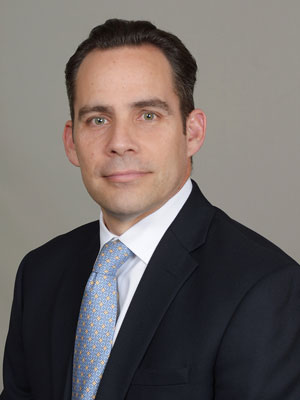 Anothony Flores, PhD
Anothony Flores, PhD
What is your current position?
I am Associate Professor (tenured) in the Division of Infectious Diseases, Department of Pediatrics, at McGovern Medical School at UTHealth in Houston, TX. Approximately one-quarter of my time is spent on inpatient consultations for pediatric infectious diseases at Children’s Memorial Hermann Hospital and MD Anderson Children’s Hospital. The remaining time I am the PI of a very active NIH-funded laboratory studying epidemic clonal emergence and pathogenesis of groups A and B streptococci.
How did your training in MBI help you with your career?
I knew very early on that I wanted to do research with bacterial pathogens and that a solid foundation in molecular genetics and pathogenesis was critical. My training in MBI (Dr. Marty Pavelka, M. tuberculosis) was absolutely that foundation I needed. I felt incredibly prepared as a postdoctoral fellow (under Dr. James Musser, another UR grad) and now as an independent investigator in bacterial pathogenesis.
What aspects of our graduate program stand out for you?
Perhaps the most important aspect of my training was the flexibility of the program. As an MD/PhD trainee (that also earned a Master’s in Public Health in my spare time) the department and my mentor were incredibly supportive of my needs as a budding young investigator. The outstanding mentorship and top-down support are without a doubt the key to the successes I’ve had to date.
I would be remiss if I did not mention the chance to hone my Haiku skills while waiting for the HPLC in Dr. Pavelka’s Lab:
Pathogenesis
Was a mystery to me
Until MBI!
What were the things you liked best about living in Rochester?
Many will say the cost of living is great (which is true) but coming from a very low population density area (Wyoming), Rochester was the perfect balance of urban and rural living. Arts, sports, and festivals were a needed and very underappreciated distraction from the rigors of graduate school. I felt that the graduate students were a close-knit group and would frequently de-stress together outside of the lab and classroom.
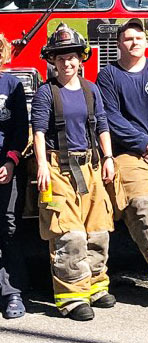 Sara Johnston, PhD
Sara Johnston, PhD
What is your current position?
I am a Regulatory Research Microbiologist at the United States Army Medical Research Institute of Infectious Diseases (USAMRIID). In my position, I am in charge of study teams which conduct foundational and translational animal model development and countermeasure efficacy evaluations for high priority pathogens (Ebola Virus, Marburg Virus, Nipah Virus, Monkeypox Virus, Rift Valley Fever Virus, Venezuelan Equine Encephalomyelitis Virus, and recently SARS-CoV-2). Although my job requires an ability to work with both BSL-3 and BSL-4 pathogens in a variety of animal models, one of my primary focuses over the past 11+ years has been on BSL-4 pathogen nonhuman primate model characterization, to include the development of a well-characterized African green monkey model of Nipah virus, and the development of a mucosal exposure model of Ebola virus in cynomolgus macaque monkeys. My other main focus has been countermeasure, primarily vaccine, efficacy evaluations using well-characterized animal models for BSL-3 and BSL-4 pathogens. This includes countless USFDA Animal Rule studies, predominantly using nonhuman primate models, in support of product packages. More recently, I have been heavily involved in the USAMRIID response to the COVID-19 pandemic, in charge of studies aimed at the development of nonhuman primate models of airborne SARS-CoV-2 infection, as well as studies designed to evaluate the efficacy of vaccine candidates.
How did your training in MBI help you with your career?
I would not have had the career I have without my training in MBI at U of R. Prior to coming to U of R, I had wanted to go to medical school, but that was just not in the cards for me. I was only an average standardized test taker, which wasn't good enough for most medical schools. Couple that with the fact that I played varsity soccer and lacrosse instead of doing extensive volunteerism while in college, and the outcome wasn't as hoped. The summer after my graduation from college, I decided that I needed to do something to make my application to medical school more appealing. When I was in college, I had a professor who taught Microbiology, and I remembered always enjoying that class. The professor was a great instructor, and also a great mentor to me during my time at Utica College. So I decided to look into MS programs in Microbiology, with the program at U of R being my first choice. I remember on one of my first days as a graduate student, they had a group of us in a room and asked us to declare the track in the MBI program we were interested in pursuing. I really didn't know exactly what I wanted to do, but I did know I didn't want to do the same thing everyone else was doing. So when everyone else in the room declared Immunology, I said I would go with Virology. I loved the program so much that, after a year, I switched into the Ph.D. program at U of R, and over the course of the subsequent 4 years my passion for virological diseases grew. I found a love for being in the lab, and especially loved the feeling I got watching an idea I had flourish into an experiment and then yield exciting results. I was also lucky enough to be working for a great mentor (Dr. Ward) doing research on a pathogen (vaccinia virus) that was similar to smallpox. Gone was the dream of becoming an MD, and in its place was a new and more exciting goal to become a Ph.D. in Microbiology. I knew that I wanted to have a career in the virology field, but I also knew that I didn't really want to work for industry. I wanted to be able to do cutting edge research that could benefit our nation in a unique way, and my desire for public service drove me to look into positions at the USAMRIID. Now, 11.5 years later, I still have a passion for the work that I do. There are the good days and the bad days, but even on the worst of days I am still proud to be a part of our important mission, and privileged to be of service to my country. None of this would have ever been possible without the MBI program at U of R.
What aspects of our graduate program stand out for you?
The mentorship that I received from Dr. Brian Ward stands out the most, and his words and teachings still echo in my ears on a daily basis. Dr. Ward took the time to explain everything in detail, making sure I had a fundamental understanding of what I was doing. It was never just following a recipe, it was understanding what each component of that recipe was, how it interacted with the other components, and how that interaction was related to the output result. He always kept me on my toes, and never allowed me to become complacent. It was his right level of encouragement (but not excessive encouragement) coupled with the right level of constructive criticism that led to the greatest scientific growth for me.
What were the things you liked best about living in Rochester?
Rochester was actually a pretty cool city. There was a lot to do, the downtown area was always fun, and the food was great (especially Dinosaur BBQ, Brandanis Pizza, and Rubino's Subs). We were a short drive from Darien Lake, Letchworth State Park, and Watkins Glen (and finger lakes wine country). One of my favorite weekly activities to do with my friends was to go to the Roost (I'm sure they have a different name now) and country line dance. Keeping with my athletic aspirations, I also enjoyed participating in club sports at U of R, including ice hockey and Tae Kwon Do. Without U of R ice hockey, I would never have been able to compete in the Empire States Games (and win a gold medal as part of the Western New York team). Without U of R Tae Kwon Do, I would never have found a passion for martial arts and, many years later, would never have been able to achieve the rank of 3rd Dan World Tae Kwon Do Federation. I was also lucky enough to have an opportunity to compete with the local women's semi-profession soccer team (the Rochester Ravens, who ultimately became the Lady Rhinos).
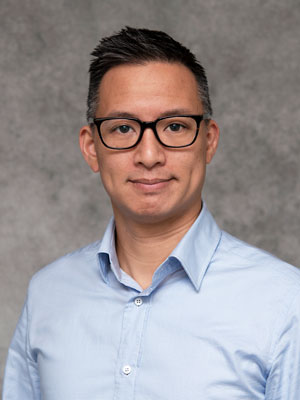 Don Nguyen, PhD
Don Nguyen, PhD
What is your current position?
Associate Professor of Pathology, Yale School of Medicine; Assistant Cancer Center Director for Research Development, Yale Cancer Center
How did your training in MBI help you with your career?
The depth and breadth of different research expertise in MBI taught me to appreciate diverse questions in biology, ranging from the very basic to translational. Being able to think anywhere along this spectrum is what keeps me motivated and excited in my career.
What aspects of our graduate program stand out for you?
The personal touch of department administrators and faculty. The camaraderie throughout the highs and lows of research (working hard and playing hard as they say!). My mentors and friends from MBI are still my top “go to” people when I need advice.
What were the things you like best about living in Rochester?
The relatively low cost of living. The public market was/is great.
 Brendaliz Santiago-Narvaez, PhD
Brendaliz Santiago-Narvaez, PhD
What is your current position?
I am an Assistant Professor (tenure track faculty) for the Department of Biology at Rollins College in Winter Park, Florida. In this position I teach courses for the Biology and Biochemistry/ Molecular Biology Majors and also have my own independent research lab.
How did your training in MBI help you with your career?
The mentorship and the exceptional research experiences I had prepared me for my academic career. The program really does a great job of addressing many of the skills you will need to be successful once you complete your training. Aspects of the program that have been invaluable to my career were: the opportunity to present my work to an audience regularly, the exceptional classes (that I still rely on to teach my own coursework!), the responsibility of developing and completing a research project of the highest caliber and the support of the faculty in providing expert insight into my work and its potential. As a student I was held at a very high standard. I would not have been able to set up my own lab ( at Rollins), make the right decisions regarding my research and the management of my lab if it weren’t for my training at UR.
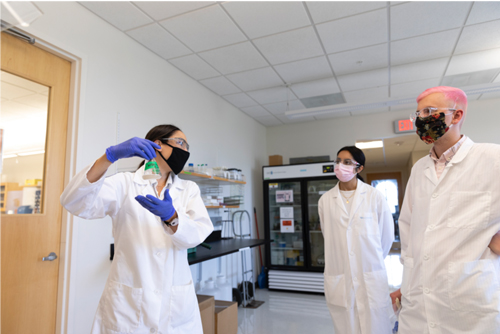
What aspects of our graduate program stand out for you?
The department has a great selection of faculty/ research options that give any student a really comprehensive research experience. The faculty and the level of research that takes place at UR is outstanding. The faculty were the major driving force behind my choosing of UR. They are amazing scientists and mentors. I could not have developed a sense of confidence I have in my work today if it were not for the faculty I worked with and the classes/ research I conducted during my training.
What were the things you like best about living in Rochester?
I loved the community, the diversity of the city, its active and flourishing art scene and also, I loved the Department. I always felt welcome in the IMV program . It is great to be in a place where everyone knows your name.
I would add that as a minority student I felt incredibly supported throughout my entire career at UR. The IMV program has done an exceptional job through the years to ensure that there is diversity among the students recruited. The support and the resources provided by the program is a testament to how they understand the needs of underrepresented minorities in the academic setting, and are committed to supporting the success of their students.